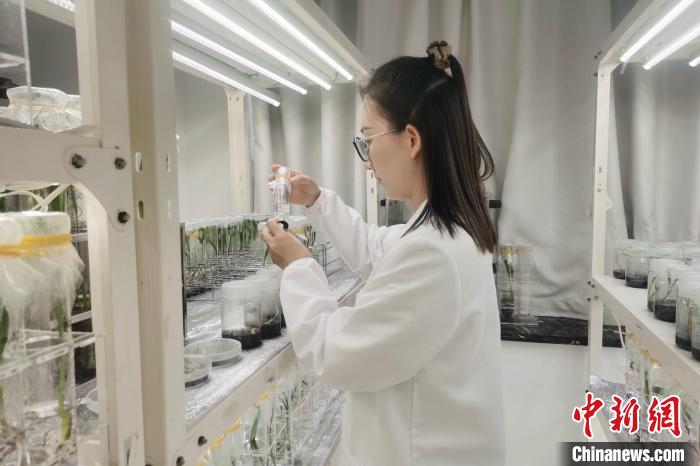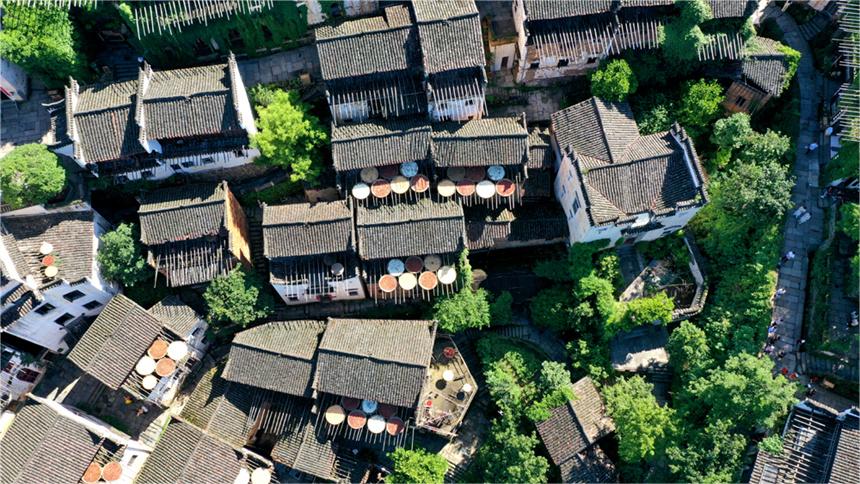Date palm trees bear fruit of China-UAE agricultural cooperation
Rows of date palm trees from the United Arab Emirates (UAE) are thriving at the "China-UAE Friendship Forest of Date Palm" in Wenchang city, south China's Hainan Province.
It takes at least three to five years for date palms to bear fruit in Arab countries, but those introduced for trial cultivation in Hainan have borne fruit in about two years, said Hu Wei, head of the Coconut Research Institute of the Chinese Academy of Tropical Agricultural Sciences.

Date palm trees from the United Arab Emirates (UAE) thrive at the "China-UAE Friendship Forest of Date Palm" in Wenchang city, south China's Hainan Province, on May 29, 2024. (Photo/China News Service)
Hu added that cooperation between China and the UAE in the development of the date palm industry has made progress.
Known as "the bread of the desert," date palms are a major food crop and an important agricultural export product in Arab countries.
China and the UAE reached consensus on the UAE's donation of 100,000 date palm seedlings to China in 2019. Two years later, the first batch of 1,500 date palm seedlings was handed over in Wenchang, and planting tests were carried out at the institute.
Chinese researchers have had certain strengths in seedling propagation technology, cultivation techniques, and pest and disease control methods for date palms, said Xu Zhongliang, deputy director of the coconut science and technology innovation at the institute.
The institute has collected over 230 date palm germplasm resources from home and abroad, and more than 20 good parental varieties from abroad, laying a solid foundation for the breeding of new date palm varieties and the development of the date palm industry.

Experts from the Coconut Research Institute of the Chinese Academy of Tropical Agricultural Sciences check on the growth of date palm trees at the "China-UAE Friendship Forest of Date Palm" in Wenchang city, south China's Hainan Province, on May 29, 2024. (Photo/China News Service)
Through continuous research efforts, the institute has explored a propagation technology system for date palm seedlings, which has been recognized by UAE companies participating in the cooperation project, and will benefit Arab countries in the future, according to Zhang Ning, a date palm expert at the institute.
The small dates bear witness to the increasingly close agricultural technology cooperation between China and Arab countries. Over the years, both sides have carried out collaborative research on dates, relying on the expertise of the Chinese Academy of Tropical Agricultural Sciences.
"The market prospects for dates, which have high nutritional value, are broad. Date palm trees are tolerant to high temperatures, drought, salinity, and low temperatures, which are also beneficial to the restoration of the ecological environment," Hu said.
He added the institute will further promote the regional trial planting of date palm trees in hot areas such as Hainan and Yunnan, carry out technological innovation, cooperation and exchanges, and serve the construction of the Belt and Road Initiative and international scientific and technological cooperation, Hu noted.

Zhang Ning, a date palm expert, works at the Coconut Research Institute of the Chinese Academy of Tropical Agricultural Sciences in Wenchang city, south China's Hainan Province, on May 29, 2024. (Photo/China News Service)
Photos
Related Stories
- China-Arab States Cooperation Forum important mechanism to enhance ties
- Blueprint set for future of Sino-Arab ties
- Chinese FM meets Arab guests
- China-Arab states cooperation accelerates building of community with shared future
- Opening ceremony of 10th ministerial conference of China-Arab States Cooperation Forum held in Beijing
- China, Arab states adopt series of outcome documents
- Key facts about China-Arab relations
- Sino-Arab cooperation to get boost, envoy says
Copyright © 2024 People's Daily Online. All Rights Reserved.









